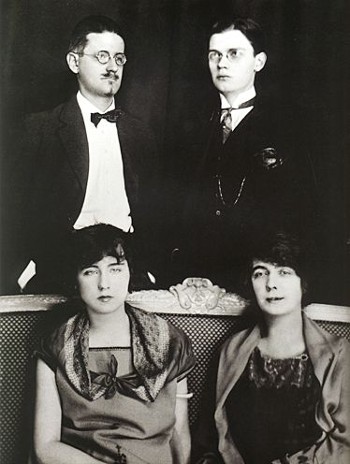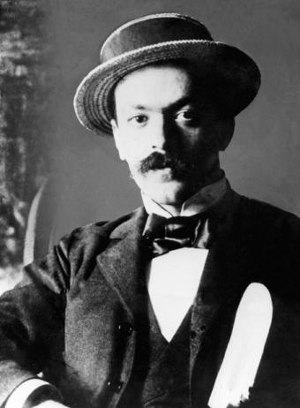Joyce, James Contents
Early adulthood
First steps as a writer
In 1904, aged twenty-two, Joyce began work on Dubliners (his short story collection) and Stephen Hero (a semi-biographical novel), wrote Chamber Music (his first poetry collection), and wrote an essay entitled 'A Portrait of the Artist' which would later be transformed into a novel entitled A Portrait of the Artist as a Young Man (1916).
Nora Barnacle
Soon after leaving his family home, Joyce met Nora Barnacle, a chambermaid from Galway. Joyce and Nora first started going out together on 16 June 1904, the date on which Joyce’s novel Ulysses (1922) is set. Four months later, the couple left Dublin for continental Europe.
Leaving Ireland: the writer as exile
 Joyce and Nora arrived in Zurich but soon moved to Pola (now in Croatia) as Joyce was offered a job teaching English with the Berlitz School. In 1905, Joyce transferred to the Berlitz School in Trieste. Except for six months in Rome, where he worked as a banker, Joyce stayed in Trieste for the next eleven years. On 27 July 1905, Joyce's son, Giorgio, was born. He was followed by Joyce's daughter, Lucia, who was born on 26 July 1907.
Joyce and Nora arrived in Zurich but soon moved to Pola (now in Croatia) as Joyce was offered a job teaching English with the Berlitz School. In 1905, Joyce transferred to the Berlitz School in Trieste. Except for six months in Rome, where he worked as a banker, Joyce stayed in Trieste for the next eleven years. On 27 July 1905, Joyce's son, Giorgio, was born. He was followed by Joyce's daughter, Lucia, who was born on 26 July 1907.
Cultural delights and eye troubles
Around the time of Lucia's birth, Joyce was hospitalised with rheumatic fever and began to experience the eye troubles which would plague him throughout his life. Despite his below-par health and lack of money, Joyce enjoyed the local culture - drinking, dining, theatre, popular opera, dances, concerts and films. He also took singing lessons from Francesco Ricardo Sinico: he later used his teacher’s name for Mrs Sinico in Dubliners: A Painful Case.
Svevo and cinema
 In 1909, Joyce became friends with Ettore Schmitz (Italian author 'Italo Svevo') who praised Joyce's unfinished manuscripts for A Portrait of the Artist as a Young Man and persuaded him to finish the novel. In December of the same year, Joyce went back to Dublin to open one of the city's first permanent cinemas – The Volta. This was a short-lived business venture; the cinema closed down in April 1910.
In 1909, Joyce became friends with Ettore Schmitz (Italian author 'Italo Svevo') who praised Joyce's unfinished manuscripts for A Portrait of the Artist as a Young Man and persuaded him to finish the novel. In December of the same year, Joyce went back to Dublin to open one of the city's first permanent cinemas – The Volta. This was a short-lived business venture; the cinema closed down in April 1910.